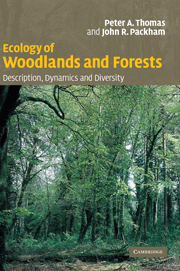Book contents
- Frontmatter
- Contents
- Preface
- Acknowledgements
- Metric equivalents
- 1 Introduction: Forest basics
- 2 Forest soils, climate and zonation
- 3 Primary production and forest development
- 4 Reproductive strategies of forest plants
- 5 Biotic interactions
- 6 Biodiversity in woodlands
- 7 Decomposition and renewal
- 8 Energy and nutrients
- 9 Forest change and disturbance
- 10 Working forests
- 11 The future – how will our forests change?
- References
- Index
10 - Working forests
Published online by Cambridge University Press: 05 June 2012
- Frontmatter
- Contents
- Preface
- Acknowledgements
- Metric equivalents
- 1 Introduction: Forest basics
- 2 Forest soils, climate and zonation
- 3 Primary production and forest development
- 4 Reproductive strategies of forest plants
- 5 Biotic interactions
- 6 Biodiversity in woodlands
- 7 Decomposition and renewal
- 8 Energy and nutrients
- 9 Forest change and disturbance
- 10 Working forests
- 11 The future – how will our forests change?
- References
- Index
Summary
Forest resources and products
Timber production and trade: loss of natural habitat
Forestry not only comprises the art and science of initiating, regenerating and cultivating woodlands and forests (silviculture, see Section 10.3.1), but also all the practical procedures involved including road construction and maintenance, felling and selling timber, control of deer and other animal populations. The main product of commercial forestry is wood, which is employed as a fuel, a most important sustainable raw material, the basis of the paper industry, and for at least 10,000 other uses (Sutton, 1999). The economics of plantation forestry in particular are complex; huge amounts of capital are involved in the ownership of the ground, and the costs of establishing a particular crop are not recovered for many years. Whereas a bakery will sell its products within a day or two, it is only in the case of the very fast-growing introduced tree species that a forester has a chance of cropping the trees he plants within his working life. The impact of the compound interest of establishment and maintenance costs on the industry is very great indeed, while the value of particular timbers varies widely with time. In the past huge areas of natural forest have been virtually plundered; exploited and cut down without regard for the long-term consequences, a process often called ‘mining’, that is treating forests as a non-renewable resource. Half of the world's forest growing 8000 years ago has already been lost.
- Type
- Chapter
- Information
- Ecology of Woodlands and ForestsDescription, Dynamics and Diversity, pp. 397 - 440Publisher: Cambridge University PressPrint publication year: 2007

